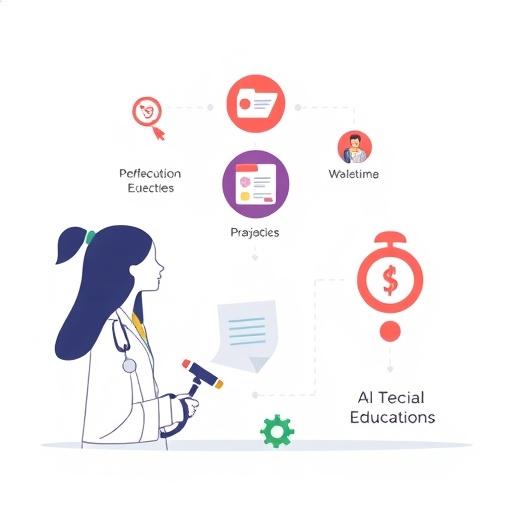In a compelling study recently published in BMC Medical Education, researchers have undertaken a significant exploration of how educational interventions can reshape the understanding and attitudes of medical students towards pharmaceutical promotion. This investigative work, conducted in Pakistan, reveals critical insights into the dynamics of pharmaceutical marketing, its influence on future medical practitioners, and the ethical implications that stem from these interactions.
Educational interventions in medical education are paramount in equipping future doctors with the necessary tools to navigate the complex landscape of pharmaceutical marketing. The study specifically evaluates the effectiveness of a structured educational program designed to enhance medical students’ comprehension of pharmaceutical promotion’s psychological and ethical dimensions. This multi-faceted approach not only aims to foster critical thinking among students but also empowers them to make informed decisions in their medical practice.
The significance of this research is underscored by the growing concerns about the impact of pharmaceutical marketing on medical education and practice. With an increasing number of promotional activities targeting medical students, there is a pressing need to understand how these factors can derail the objectivity required in clinical decision-making. The study meticulously reviews how educational initiatives can counteract potential biases induced by such marketing strategies.
At the heart of the research lies the objective assessment of students’ perceptions before and after the educational intervention. The methodology employed is robust, utilizing both qualitative and quantitative measures to evaluate the intervention’s effectiveness. By employing surveys and focus groups, the researchers were able to garner comprehensive qualitative data that provides profound insights into students’ attitudes regarding pharmaceutical promotions over time.
An astonishing aspect of the study is the measurable change in the students’ attitudes towards pharmaceutical marketing. Before the intervention, a significant number of students expressed a favorable view of the promotional activities they encountered. However, post-intervention assessments demonstrated a marked shift, with a higher percentage of students recognizing the potential for conflict of interest embedded within such promotions. This shift signifies a crucial learning milestone for the participating students, highlighting the potential for education to change perceptions and subsequent medical practice.
In parallel, the study emphasizes the necessity of cultivating a culture of skepticism among young medical professionals. The need for a critical eye when assessing the information provided by pharmaceutical companies cannot be overstated. By fostering critical inquiry and ethical reflection, the educational intervention serves not only to inform but also to prepare students to face these challenges head-on in their future careers.
Additionally, the ramifications of this study extend beyond the realm of education. By underscoring the necessity of ethical considerations in medical practice, the research may stimulate broader discourse around curricula reforms in medical schools worldwide. Institutions may take heed of these findings to enhance their educational frameworks, creating more informed, ethically-aware healthcare providers.
The exploration of the intersection between education and pharmaceutical promotion is an area ripe for further inquiry. Future studies could expand upon this work by exploring the long-term impacts of educational interventions on medical practice and patient care. As the healthcare landscape continues to evolve, understanding these dynamics will be critical for fostering a more ethical approach to medicine.
The implications of the findings bear weight on regulatory discussions as well. Policymakers can benefit from this research by understanding the critical need for regulatory frameworks that manage pharmaceutical promotion in educational settings. This could lead to an environment that prioritizes the integrity of medical education and the welfare of patients, ensuring that future doctors are less susceptible to external influences.
Moreover, this study aligns well with the broader calls for transparency and accountability within the pharmaceutical industry. As public awareness of these issues increases, the pressure mounts on pharmaceutical companies to adopt more ethical marketing practices. Changes within this sector could ultimately lead to enhanced patient trust and better health outcomes, reflecting the ripple effect of educational interventions.
In conclusion, this follow-up study among medical students in Pakistan significantly contributes to the discourse on medical education and pharmaceutical promotion. It highlights the powerful role education can play in shaping perceptions and ethical practices. The commitment of the researchers to uncover these insights represents a vital step forward in ensuring that future medical practitioners can appropriately navigate the complex terrain of pharmaceutical influences.
This research not only enlightens current educational practices but also serves as a clarion call for medical schools globally to re-evaluate how they approach the integration of ethical considerations into their curricula. The transformation in medical education, spurred by such robust research, heralds a future where healthcare providers can be both informed and ethically grounded in their practice.
By addressing these fundamental issues in medical education, we pave the way for a healthcare workforce that prioritizes patient welfare and fosters a more ethical approach to medical practice, ultimately leading to a healthier society.
Subject of Research: Educational interventions on pharmaceutical promotion impacts among medical students.
Article Title: Assessing the effect of educational intervention on pharmaceutical promotion: a follow-up study among medical students from Pakistan.
Article References:
Gillani, A.H., Arshad, H., Arshed, M. et al. Assessing the effect of educational intervention on pharmaceutical promotion: a follow-up study among medical students from Pakistan.
BMC Med Educ 25, 1199 (2025). https://doi.org/10.1186/s12909-025-07725-3
Image Credits: AI Generated
DOI: 10.1186/s12909-025-07725-3
Keywords: educational intervention, pharmaceutical promotion, medical students, ethical implications, medical education, critical thinking.




